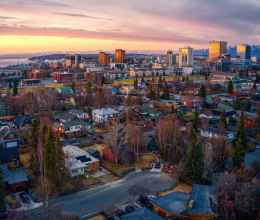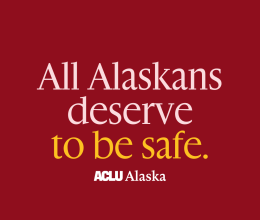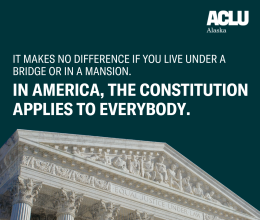
Homelessness and housing pose significant challenges for our communities, especially since the U.S. Supreme Court’s decision in Grants Pass v. Johnson last year. The legal landscape on these issues continues to evolve; however, the values we hold as Alaskans, as stated in our constitution, remain clear. Each of us has the right to health and welfare, and the right to be safe.
The Grants Pass decision last June held that punishing unhoused people for sleeping in public did not violate the Cruel and Unusual Punishment Clause. The Supreme Court, however, emphasized that other parts of the U.S. Constitution limit what local governments can do to regulate activities in their communities.
In the wake of Grants Pass, cities across the country have been struggling to address homelessness. Many have proposed new laws to criminalize sleeping in public, and as a result, unhoused people face thousands of dollars in fines and even jail time for sleeping outside. When there are no shelter beds or housing options, it is unrealistic to expect that people can comply with the law. In addition, this approach costs taxpayers money, makes our communities less safe, and makes it harder to solve homelessness.
Anchorage has a chance to do things differently. As a welcoming community, our municipal leaders can work with local organizations to find our way through our homelessness crisis with compassion and accountability.
The ACLU of Alaska is deeply committed to partnering with local leaders to find housing-based solutions to Anchorage’s housing and homelessness crisis. In reviewing the landscape of current policy proposals, we offer the following framework for effective housing policies in the city:
- All policies should maintain a “Whole Community” approach to public safety and well-being. The homelessness crisis affects our entire community, requiring short, mid and long-term solutions that promote and protect everyone’s safety and well-being as a fundamental goal. Any effective solution will connect people with the support they need to achieve those goals.
- Municipal leaders should stick to the plan(s). The Municipality of Anchorage adopted the “Anchored Home” 5-year strategic plan in 2018 and updated that plan in 2023. These plans are comprehensive and articulate systemic solutions to the homelessness crisis. All MOA policy responses should reaffirm the vision, strategy, and tactics these plans articulate. This approach is productive, promoting accountability and transparency to foster public trust.
- Create policies that adhere to our U.S. and Alaska Constitutions. Municipal leaders should create public policies that are constitutional and address the root causes of homelessness alongside the immediate needs to ensure public safety. The U.S. and Alaska Constitutions provide important guardrails to protect our most vulnerable community members, including:
- Ensure Due Process: Ordinances should clearly state where people can or cannot self-shelter and be written in clear terms, so people know what the rules are and can comply with them. If maps are provided, they should likewise be clear regarding where self-sheltering is prohibited.
- Avoid Excessive Fines: Both the state and federal constitution prohibit excessive fines. A fine is considered excessive if it is grossly disproportionate to the alleged offense. Ordinances that impose any fine for basic physical needs, such as sleeping, especially when there is no indoor shelter space available—risk running afoul of the clause. A person who cannot pay rent or to house themselves cannot pay thousands of dollars of fines imposed by proposed laws.
- Provide for the public health, welfare, and safety of all Alaskans. The directive of Article 7 of the Alaska Constitution is best achieved by funding the services people need to exit homelessness rather than criminalizing life-sustaining activities, like sleeping outside. All residents should have access to basic necessities, such as clean water, waste removal, and restroom facilities.
- Ensure Due Process: Ordinances should clearly state where people can or cannot self-shelter and be written in clear terms, so people know what the rules are and can comply with them. If maps are provided, they should likewise be clear regarding where self-sheltering is prohibited.
We are committed to finding solutions to Anchorage’s housing crisis that treat all people with dignity, including those experiencing homelessness. The Municipality of Anchorage and communities across Alaska have the opportunity to reflect the best of Alaskans through advancing policies that are constitutional, humane, and lead to housing-based solutions for unhoused residents.

